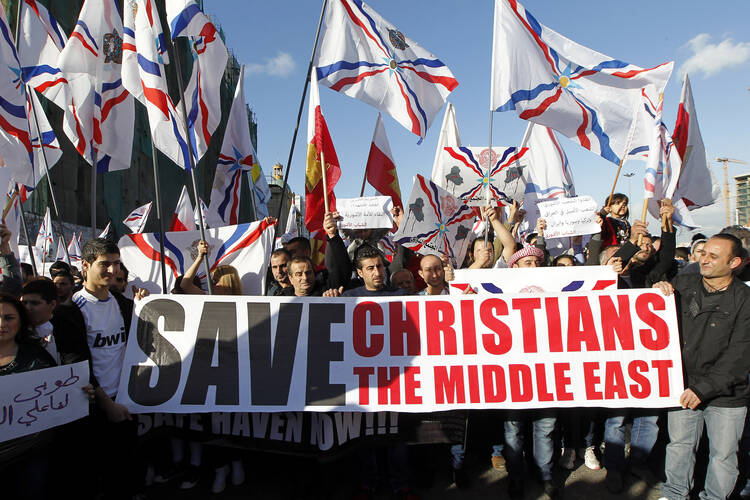In a joint statement, representatives of more than 60 countries have recognized that Christians are particularly endangered in the Middle East, and they called on the international community to reaffirm the human right to freedom of religion. The violence carried out by terrorist groups “creates the risk of complete disappearance for the Christians” in the region, they said.
The statement, submitted to the U.N. Human Rights Council in Geneva on March 13, was sponsored by the delegations of the Holy See, Lebanon and Russia. The United States, Canada, the United Kingdom, Australia, Iraq and Israel were among the 63 signatories.
Ongoing conflicts in the region have been “disastrous for the entire population” and have “seriously threatened” the existence of “many religious communities,” the statement said. People continue to fall victim “to barbaric acts of violence” and “churches and ancient shrines of all religions have been destroyed.”
The statement then zeroed in on the Christian situation. “Christians are now especially affected,” said the statement. “These days even their survival is in question.
“There are more and more reasons to fear seriously for the future of the Christian communities that have more than 2,000 years of existence in this region, where Christianity has its full place and began its long history,” the statement said.
The signatories called on the international community to support the human rights of Christians and other religious and ethnic communities in the Middle East and to work toward building “a culture of peaceful coexistence.”
“A future without the different communities in the Middle East will run the risk of new forms of violence, exclusion and the absence of peace and development,” they warned.
Discussing the statement, the Holy See’s representative to U.N. agencies in Geneva, Archbishop Silvano Tomasi, acknowledged the complexity of the region but stressed the importance of focusing the international community on the suffering of Christians and other minority groups. Islam, he argued, must not be used as an ideological excuse for violence against vulnerable communities.
According to Archbishop Tomasi, the initiative has already prompted the French government to call for a special session of the U.N. Security Council to deal with the problems of Christians in the Middle East. At this meeting, scheduled for March 27, Archbishop Tomasi said the French foreign minister will speak to the Security Council in New York on the need to defend Christians in the region. Archbishop Tomasi said he hopes that raising global public awareness of the plight of Christians in the Middle East “will encourage local authorities and the international community to support their right to remain and prosper in the land of their ancestors.”
Just days after the statement was released, it became clear that Christian communities were imperiled beyond Middle Eastern states when suicide bombers struck two churches—one Catholic and one Protestant—in Lahore, Pakistan, on March 15. The twin attacks took place during packed Sunday services in Youhanabad, one of Lahore’s largest Christian neighborhoods; 14 people were killed and scores were wounded. Street disorders quickly flared, and angry mobs seized two men believed to be involved in the attack; according to local media reports, one of them was burned alive.
Pope Francis quickly condemned the suicide bombings. “Our brothers’ and sisters’ blood is shed only because they are Christians. As I assure you of my prayers for the victims and their families, I ask the Lord, I beseech the Lord, source of all good, for the gift of peace and harmony to this country.” Concluding his appeal, Pope Francis prayed “that this persecution against Christians, which the world tries to hide, might end, and that there be peace.”








